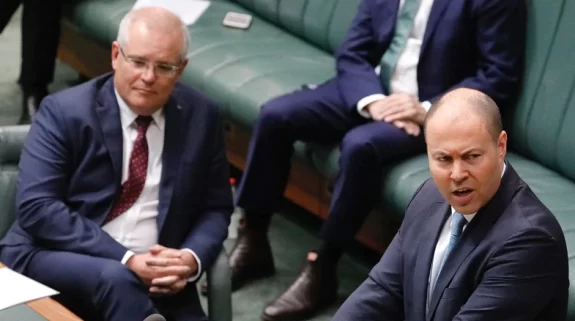Federal budget reform needed to cope with increasing natural disaster costs

CEDA Media Release
The pressure brought on by massive stimulus funding during the COVID-19 pandemic and future headwinds including ageing and the costs of climate change have brought Australia to the point where wholesale budget reform is now a necessity, according to a new paper released by the Committee for Economic Development of Australia.
“The arbitrary budget targets and narrow focus on budget surpluses that have underpinned Australia’s budget approach do not guarantee budget sustainability and will carry significant economic costs in a supply constrained economy,” says CEDA Chief Economist Jarrod Ball.
“As Australia faces the challenges of weak productivity and an aging population, spending taxpayer dollars well to deliver high quality services and build productive capacity in the economy is more important than ever.
“Several targets in the current fiscal strategy have been there in one form or another since the early 2000s despite being unmet, unsound, or inappropriate in the economic environment.
“As the government faces a complex juggling act of unwinding the stimulus required during the pandemic and investing in long-term programs such as aged care, now is the time for government to change its approach to ensure Australia’s long-term budget sustainability. This includes moving to a whole-of-federation overview of Australia’s finances through a national Intergenerational Report.”
Australia has recorded 14 consecutive deficits and over the last 40 years, there are only six years in which Australia could claim to have been running a balanced budget on average over the preceding decade.
“Strict quantitative budget targets are blunt tools that constrain choices, leading policymakers to impose efficiency dividends, levies and other short-term savings that don’t improve value for money or budget sustainability over the long-term,” says Mr Ball.
“The community then bears the burden of arbitrary caps and artificial constraints through inadequate services in the longer term. This has been seen all too painfully in areas such as the aged care system, hospital funding and higher education.”
Other challenges to the budget are the growing financial risks of climate change. In NSW alone, the state government is projecting up to $17.2 billion of economic costs from natural disasters on average each year by 2060.
To improve fiscal sustainability, after the Federal election, the government should reset the budget framework to deliver quality budget measures that lift the capacity of the economy to grow while maintaining long-term budget sustainability. This involves:
• Tasking the Parliamentary Budget Office (PBO) to undertake a whole of federation Intergenerational Report to provide a complete picture of Australia’s finances;
• Reviewing the 25-year-old Charter of Budget Honesty Act to increase scrutiny and transparency of the budget;
• Reviewing and updating the medium-term fiscal strategy to stabilise and reduce net debt while also facilitating the right investments to boost the productive capacity of the economy; and
• Establishing a rolling schedule of program evaluations.
A comprehensive budget reset will complement the bipartisan agreement to review the Reserve Bank of Australia, reassessing the full suite of macroeconomic tools to ensure they are in the best shape to support the economy and respond to future shocks.
“Governments must now focus all of their policy levers on lifting Australia’s capacity to grow into the future and deliver the services that will underpin Australians’ health and wellbeing,” says Mr Ball.
About CEDA
CEDA – the Committee for Economic Development of Australia – is an independent, membership-based think tank.
CEDA’s purpose is to identify policy issues that matter for Australia’s future and pursue solutions that deliver better economic and social outcomes for the greater good.
CEDA has almost 700 members including leading Australian businesses, community organisations, government departments and academic institutions. Our cross-sector membership spans every state and territory.
CEDA was founded in 1960 by leading economist Sir Douglas Copland. His legacy of applying economic analysis to practical problems to aid the development of Australia continues to drive our work today.
Like what we do at The AIMN?
You’ll like it even more knowing that your donation will help us to keep up the good fight.
Chuck in a few bucks and see just how far it goes!
Your contribution to help with the running costs of this site will be gratefully accepted.
You can donate through PayPal or credit card via the button below, or donate via bank transfer: BSB: 062500; A/c no: 10495969










3 comments
Login here Register here-
Claudio Pompili -
leefe -
New England Cocky
Return to home pageNothing to worry about…
Both LNP and Labor are ramping up our belligerence towards China and Russia (and any nation that our US puppet-master determines is the enemy), hysterically beating the drums of war, and spending like drunken sailors on ‘defence’ [sic] aka offensive military assets, that will inevitably make us targets.
No matter, broad bipartisan support for defence jobs’n’growth and bugger the bush fires, floods, crap NBN, infrastructure etc.
We need the Icelandic solution….tabula rasa…jail the corrupt corporations and politicians, and nationalise critical infrastructure. Start again as a republic, new Constitution, neutral foreign policy, and remove all USA military assets from our sovereign soil.
Or we could focus on sustainability rather than the everlasting “more, more, more; bigger, bigger, bigger, faster, faster, faster” mentality demonstrated here.
The only economic reforms required in Australia are the elimination of government financial support for foreign owned multinational corporations that legally pay no corporate taxation in Australia.
Then remove other vote buying subsidies like state aid to private schools and corporate executive tax perks.
Naturally a necessary reduction in the salary packages and retirement perks of politicians would never be considered by any Parliament.